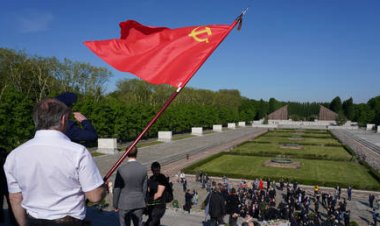Why Trump’s Support May Not Solve Kari Lake’s Issues
As Lake confronts a contentious past with her own party, her Democratic challenger, Ruben Gallego, is wagering that Arizonans lack confidence in Lake and are eager to reclaim their abortion rights.

Lake’s message to Arizona emphasized unity: Vote Trump, vote Lake, vote Republican.
This rally demonstrated a key challenge faced by Lake’s campaign. Since her gubernatorial bid, she has closely aligned herself with Trump in both her policies and her style, hoping that this strategy would resonate with voters in the state. However, she has not garnered the same level of backing as Trump and is falling behind Gallego in recent polls by as much as 6 points.
"Lake is basically Donald Trump with all the negative [and] none of the positives,” remarked Arizona pollster Mike Noble, noting that while Trump can lean on his perceived policy successes, Lake lacks a similar record in elected office. Paul Bentz, a pollster from HighGround, explained that “Rallies of adoring fans” and attracting “good crowds” won't suffice for winning a statewide race in Arizona, especially for someone who isn’t Trump.
To secure the necessary support, Lake must appeal to moderates and Republicans beyond Trump’s base. Her campaign seems aware of this, as evidenced by her efforts to soften her message during her Senate run. Yet with early voting underway, it has become clear that connecting with this broader demographic presents a significant challenge, and her MAGA support may not fill the gaps. A recent survey by Noble Predictive Insights indicated that more than 20 percent of overall Republicans view her unfavorably, along with over half of independent voters.
Lake’s recent actions have earned her a negative reputation among many voters. During her gubernatorial run in 2022, she took cues from Trump to distance herself from the faction of the Republican Party that supported the late Sen. John McCain. Following her primary victory, she infamously declared, “we drove a stake through the heart of the McCain machine.” Lake narrowly lost to Democratic Gov. Katie Hobbs, a defeat that some attribute to her refusal to accept the 2020 presidential election results and her alienation of moderate Republicans. Even now, Lake continues to legally contest the election outcome as she campaigns for the Senate.
Supporters of Lake argue that she has made strides in rallying her party. She appears to be adopting a more conciliatory stance, stating, “I may have disagreed with [Sen. McCain] on some policy issues, but I respected him.” Nevertheless, her critics maintain that her actions initially strained party unity.
In an effort to connect with a wider range of voters, Lake has focused on fundamental issues like the economy and immigration. For instance, during a recent debate with Gallego, she sidestepped questions regarding her 2022 election defeat by redirecting the conversation to water issues. However, abortion rights are perhaps the issue where she has struggled the most to maintain a moderate stance. Since the Supreme Court’s Dobbs decision, Arizona Democrats have organized efforts to support a ballot initiative for abortion access. While abortion may not sway key Republican and independent voters, Lake’s inconsistent statements on the issue highlight a larger challenge: her extreme rhetoric propelled her into the national MAGA spotlight, and many Arizonans are skeptical of her claims of moderation.
At the same time, Gallego is also attempting to navigate the center without being sidelined as a far-left candidate, a portrayal he rejects as a "D.C. term." As a Marine Corps veteran, he emphasizes protecting reproductive rights and securing the border, though he avoids labeling himself precisely as “moderate” or “progressive.” Gallego has been successful in garnering support from women and Latino voters. He critiques Lake for failing to engage a broad spectrum of Arizona voter concerns, stating, “She doesn’t have it in her to try to appeal or talk to all of Arizona.”
Gallego doubts Lake will pivot away from her stance on election denialism, which some Republicans wish she would abandon, remarking, “It is almost guaranteed that she’s not going to accept the results.” Lake did not respond to inquiries regarding her feelings about election security.
Stan Barnes, a former Republican state lawmaker, notes Lake's charisma on stage but expresses concern over her ability to attract swing voters. He believes that if she could be less combative and more inclusive, she would have a better chance of success. Yet, he adds, “it’s like the 11th hour, and how does a leopard change its spots?”
This spring, Lake appeared to soften her hardline stance on abortion following Arizona’s Supreme Court's endorsement of a near-total ban on abortion. In a campaign video, she stated, “I agree with President Trump. We must have exceptions for rape, incest and the life of a mother” and expressed opposition to a federal ban.
However, earlier in her gubernatorial campaign, she had condemned abortion as the ultimate sin and praised the 1864-era ban. Following her more moderate stance, she later critiqued the enforcement of the ban, complicating her narrative. Ultimately, the ban was rescinded thanks to Democratic leaders and two Republican state senators who voted for repeal in May. Dr. Gabrielle Goodrick, who leads an abortion clinic in Phoenix, believes that had Lake won the governor's race, it would have led to devastating restrictions, expressing confidence in Hobbs’ victory as the reason she wasn’t more anxious.
Arizona currently upholds a 15-week ban with limited exceptions, one that would not include cases of rape or incest, in addition to a prohibition on abortions due to genetic abnormalities—all signed by former Republican Gov. Doug Ducey. A proposed constitutional amendment would secure abortion rights in Arizona at least until fetal viability.
Uncertainty remains regarding whether abortion stances will sway Republican and independent voters or drive increased turnout among Democrats. Remarkably, Noble's firm discovered that the portion of Arizona voters who considered a candidate’s abortion position as “very impactful” only rose slightly from 36 to 38 percent following the ruling on the 1864 ban. “People don’t wake up one day and go, ‘Oh, I'm pro-choice,’ and a week later go, ‘Oh, I'm pro-life,’” Noble emphasized.
For Lake, the evolving discourse on abortion has uncovered traits that certain voters dislike: “She speaks to what she feels she can sell,” commented Ruth Lambert, who has been organizing signature collections for the abortion ballot initiative.
While Trump has faced backlash from anti-abortion supporters due to his contradictory statements on the issue, his base appears forgiving of his inconsistencies. In contrast, Gallego has capitalized on Lake's past comments in campaign ads, which exacerbate her existing troubles: moderate voters, already wary of her extreme rhetoric, are unconvinced by her recent attempts at moderation.
Julie Spilsbury, a city council member in Mesa and active member of the Church of Jesus Christ of Latter-day Saints, shared that many religious voters are unable to support a candidate who backs legal abortion. While she identifies as pro-life, she recognizes the complexity of the issue. “It’s not black and white,” she noted, suggesting that Lake may have adjusted her views because she realized the unpopularity of severe abortion restrictions. Spilsbury expressed frustration with both Lake and Trump for their divisive rhetoric, explaining that it frames the political landscape as a battle for America’s soul. Although she voted for Sheriff Mark Lamb in the Republican primary, she has since engaged in events supporting Harris and Gallego.
“It’s not hard for me to make this decision,” she reflected, acknowledging that her community may judge her for it.
In a recent campaign video, Lake denounced “lies” about her abortion position, proclaiming that the 15-week law is “actually a good law.” Overall, her campaign seems to be sidestepping the topic, while Gallego's stance on reproductive freedom has become a critical asset, particularly among younger Latino voters.
Gallego has made securing abortion rights his top priority if elected, aspiring to codify Roe at a national level. He explained that his support for reproductive autonomy grew partly from feeling responsible for the women in his family growing up, noting that he witnessed peers leaving school to give birth. As a father of two, including a 15-month-old daughter, he recalls the unsettling conversations he and his wife had about potential complications during pregnancy following Dobbs.
“Kari Lake, given the opportunity, will absolutely ban abortion,” Gallego asserted. “This is why we have Republican women that are supporting me. They don't trust her.”
On a sweltering afternoon in Tempe, around 50 young people—many from Arizona State University—gathered at a café to support Harris's campaign, along with local band Desert Child. When Maxwell Frost, the youngest member of Congress, took the stage, he asked about Lake: “Y'all know about Kari Lake?” prompting laughter from the young crowd. “Dude, she's wild,” he said, humorously contrasting traditional notions of patriotism with a more inclusive view of caring for every individual.
Like Harris, Gallego is working to establish his identity independent of external labels. His efforts to avoid being seen purely as a far-left candidate have been receiving positive feedback. Chuck Coughlin, CEO of HighGround, revealed that while changing perceptions is difficult, he sees Gallego making an effort: “Ruben goes and meets with them. He wants to learn.”
In conversation with Gallego, I noted his determination to connect with a diverse array of voters, even as he voted with President Joe Biden on numerous occasions during the past two years. Beyond abortion, he is focused on water security, especially with renegotiations for the Colorado River basin looming, aiming for conservation while addressing potential cuts Arizona faces due to drought. Regarding border security, he is advocating for additional resources from the Biden administration.
Addressing concerns activists voiced about migrants with legitimate asylum claims being denied entry under Biden's order, he emphasized the need for first-hand experiences at the border, stating that, “the system is being abused.” He advocates for increasing the number of Border Patrol agents and highlights endorsements from various unions.
In contrast, Lake has received endorsements from some previous critics, including Lamb, Ducey, and Robson, who highlight the larger implications of a Democratic agenda.
Yet not everyone is convinced. Kathy Petsas, a former Republican legislative chair, expressed confusion over Lake's inconsistent messaging after her primary win, questioning, “Is it unity or not?” Petsas later met with Gallego and debated voting for him, despite her reservations about both Senate and presidential candidates.
“I'm an undervote,” she candidly admitted, acknowledging its risks.
Still, Spilsbury mentioned that many pro-Trump individuals within her community are likely supporting Lake. She was optimistic that the people she knew who voted for Trump would also support her campaign.
Emily Johnson for TROIB News
Find more stories on the environment and climate change on TROIB/Planet Health












